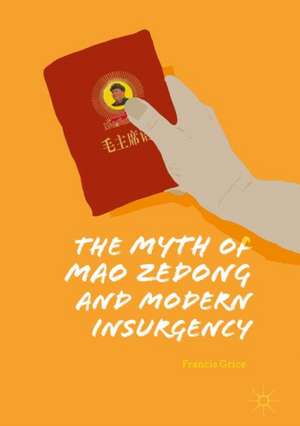The Myth of Mao Zedong and Modern Insurgency
Autor Francis Griceen Limba Engleză Hardback – 3 iun 2018
| Toate formatele și edițiile | Preț | Express |
|---|---|---|
| Paperback (1) | 885.00 lei 43-57 zile | |
| Springer International Publishing – 23 ian 2019 | 885.00 lei 43-57 zile | |
| Hardback (1) | 890.37 lei 43-57 zile | |
| Springer International Publishing – 3 iun 2018 | 890.37 lei 43-57 zile |
Preț: 890.37 lei
Preț vechi: 1085.82 lei
-18% Nou
Puncte Express: 1336
Preț estimativ în valută:
170.43€ • 185.18$ • 143.25£
170.43€ • 185.18$ • 143.25£
Carte tipărită la comandă
Livrare economică 21 aprilie-05 mai
Preluare comenzi: 021 569.72.76
Specificații
ISBN-13: 9783319775708
ISBN-10: 3319775707
Pagini: 228
Ilustrații: XI, 219 p.
Dimensiuni: 148 x 210 x 21 mm
Greutate: 0.43 kg
Ediția:1st ed. 2019
Editura: Springer International Publishing
Colecția Palgrave Macmillan
Locul publicării:Cham, Switzerland
ISBN-10: 3319775707
Pagini: 228
Ilustrații: XI, 219 p.
Dimensiuni: 148 x 210 x 21 mm
Greutate: 0.43 kg
Ediția:1st ed. 2019
Editura: Springer International Publishing
Colecția Palgrave Macmillan
Locul publicării:Cham, Switzerland
Cuprins
1. Introduction
2. What Mao Actually Taught
3. The Unoriginal Mao
4. Mao and the Chinese Revolutionary Civil War
5. The Insignificant Mao
6. The Deification of Mao
7. Conclusion
Notă biografică
Francis Grice is Assistant Professor of Political Science and International Studies at McDaniel College, Maryland, USA.
Textul de pe ultima copertă
Tackling one of the most prevalent myths about insurgencies, this book examines and rebuts the popular belief that Mao Zedong created a fundamentally new form of warfare that transformed the nature of modern insurgency. The labeling of an insurgent enemy as using “Maoist Warfare” has been a common phenomenon since Mao’s victory over the Guomindang in 1949, from Malaya and Vietnam during the Cold War to Afghanistan and Syria today. Yet, this practice is heavily flawed. This book argues that Mao did not invent a new breed of insurgency, failed to produce a coherent vision of how insurgencies should be fought, and was not influential in his impact upon subsequent insurgencies. Consequently, Mao’s writings cannot be used to generate meaningful insights for understanding those insurgencies that came after him. This means that scholars and policymakers should stop using Mao as a tool for understanding insurgencies and as a straw man against whom to target counterinsurgency strategies.
Francis Grice is Assistant Professor of Political Science and International Studies at McDaniel College, USA.
Caracteristici
Highlights how the strategies and tactics used by later insurgent groups diverged substantially from Mao’s teachings and made no real effort to truly incorporate his theories into their own conflicts
Incorporates some of the latest scholarly research about Mao Zedong, including new evaluations of his actions during the Chinese Revolutionary Civil War
Involves and bases its arguments upon a comprehensive, rigorous, and evidence-based analysis of all of Mao’s writings, providing a much more thorough and accurate portrayal of his teachings, the problems within them, and their muted relevance and applicability for future insurgencies
Incorporates some of the latest scholarly research about Mao Zedong, including new evaluations of his actions during the Chinese Revolutionary Civil War
Involves and bases its arguments upon a comprehensive, rigorous, and evidence-based analysis of all of Mao’s writings, providing a much more thorough and accurate portrayal of his teachings, the problems within them, and their muted relevance and applicability for future insurgencies
